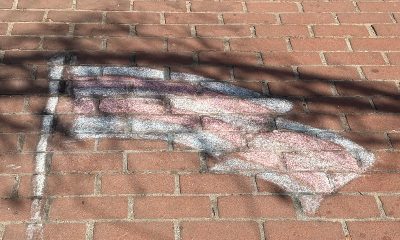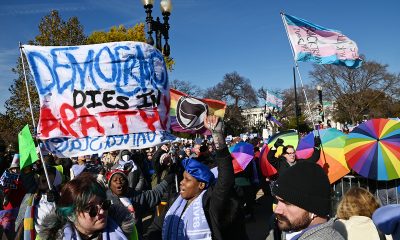Arts & Entertainment
Change of heart
Texas PFLAG mom shares journey of accepting her lesbian daughter
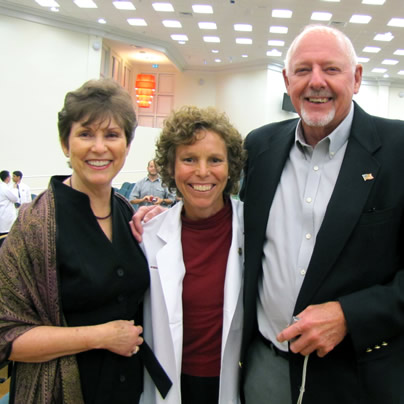
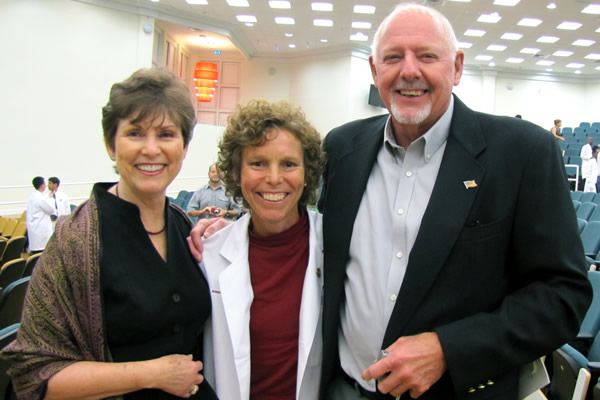
Shari Johnson (left) with her daughter Cholene and husband James in Grenada for Cholene’s white coat ceremony at the start of her medical school program in January 2011. (Photo courtesy Johnson/Changing Lives Press)
Shari Johnson hasn’t thought much about Mother’s Day.
“I really haven’t thought that far ahead,” the long-time Odessa, Texas, mother, grandmother, great-grandmother and conservative Evangelical Christian says by phone from her home. “[My children] pretty much call me if they’re available but I try not to put a whole lot of that unrealized expectation into things. They have their own lives and their own spouses so it’s about them and that’s how it should be and it works for us.”
Johnson might not be thinking much about being a mom this weekend but it’s a topic she’s thought about intently in recent years. Her first book “Above All Things,” published through her daughter Cholene Espinoza’s Changing Lives Press, comes out May 21 and tells of Johnson’s nearly decade-long journey from the time Cholene came out to her by phone as a lesbian in July 2002, to Johnson’s status now as a PFLAG mom (she started a chapter of the gay-affirming group in Odessa) who has retained her faith in the process (order the book here).
The book tells extensively of Johnson’s (a former dental hygienist) rocky early life, her born-again experience in 1971 after two failed marriages, the black-and-white world view that developed out of years of going to Evangelical churches and the painful journey that came from not only accepting her daughter being gay, but the extensive ramifications it had on every aspect of her life.
Though her prayer had initially been that Cholene — an overachiever pilot with years of Air Force and commercial flying under her belt who’s now in medical school — would “be delivered” from homosexuality, Johnson now sees the experience as a catalyst for a radical adjustment to her faith and overall world view. She credits God with her change of heart and writes several times in the book of experiences where she feels the Lord was speaking to her.
“I kept praying that God would change my daughter but I’m the one who ended up being changed,” Johnson writes. “Prior to this time, I thought I had all the answers. Now I’m not even sure that I understand the questions. I viewed life as being either black or white, there was no gray. I avoided anyone who didn’t think as I did. I was a ‘my-mind-is-made-up-don’t-confuse-me-with-the-facts’-type of person.”
But Johnson’s views began to evolve as she realized her daughter’s 2004 marriage to White House correspondent Ellen Ratner was bringing an unfairly different reaction than it would have had she been marrying a man, the hypocrisy she says Christians often exhibit when talking of the supposed sin of homosexuality compared to most other sins (of which Johnson says they often given themselves a “free pass”), and the realization that nobody (especially a Christian) would choose a gay orientation for themselves. These epiphanies had life-changing effects on her.
After years of study and thought, Johnson believes centuries of anti-gay preaching in Christian churches of most varieties comes down to mistakes in scriptural interpretation.
“If we believe that homosexuality is not a choice, then we have to either believe that God is cruel to have played this terrible trick on people and not the loving God we think he is (and that would be a God I could not serve),” she writes in the book. “Or there has to be a mistake in interpreting the scriptures. I chose to believe the latter.”
Though initially highly skeptical, Johnson feels the Lord brought her to a place where she was able to consider that she may have been wrong before.
“I always thought I had sought the will of God in my life before but I realize now what I had often been doing was going to him with my plan and then leaving before I got an answer,” she says. “If people are truly seeking, and all I’m asking people to do is consider that we could be wrong on the way some of these scriptures have been interpreted over the years, but when I finally got around to reading what some of these writers were saying — and I avoided even reading this stuff for the longest time — I realized I needed to start thinking for myself and not just keep blindly repeating what someone else had told me.”
Johnson credits the writings of Rev. Paula Jackson and her work “What Does the Bible Say About Being Gay? — Probably Not What You’ve Been Told,” with helping her expand her theological horizons. That Jackson didn’t write in a “histrionic, blasphemous, in-your-face” manner that “didn’t disregard my point of view,” resonated with Johnson.
“She just presented the facts and lets the reader come to his or her own conclusions,” Johnson writes. “The entire study boils down to this one question: What if we’re wrong?”
Espinoza, who eventually hopes to work as a doctor with Ratner in South Sudan, says it’s important for gay Christians to follow the example of Christ rather than get sidelined in what she and her mother now feel is misconstrued anti-gay theology.
“Christ did not have anything to say about homosexuality but he had a lot to say about love, honor and respect,” she wrote in an e-mail to the Blade. “If we are loving, honorable and respectful in our relationships, I think that reduces a lot of the guilt and self loathing in our heads. We need to separate those who condemn us from the message of love and reconciliation, the message that Christ has brought to us.”
Johnson has become a staunch advocate for LGBT acceptance within Christian churches in the Odessa area. It’s led to a thorny conundrum — she’s tried sharing her story, but often leaves Bible studies and church services feeling she’s been merely placated. She’s at a point now where she can’t stomach anti-gay teaching from the pulpit and has left several churches in frustration. She says gay-welcoming churches in her part of the state are pretty much non-existent.
Johnson has lots of interesting opinions on trends in the modern church, especially with the anti-gay teaching that abounds in the Bible Belt.
She concedes there is a time, whether it’s in the political or religious realm, where it’s OK to respectfully agree to disagree.
“This whole idea of, ‘You have to see things my way,’ that’s never worked in politics, religion or anything else,” she says. “It never worked and it never will. But God gave me a big wake-up call and I would love for other people to not have to go through what I went through. That’s really why I wrote the book.”
She says it’s possible that churches with anti-gay teaching that seem to be thriving — even those led by household-name preachers like Rick Warren and Joel Osteen — might not be as blest as it appears.
“You can’t always assume that God’s blessing a church just because of the numbers,” she says. “People go to church for all sorts of reasons. And when these men have been put on the spot on national television and asked about gay issues and the whole Christian community is sort of collectively holding its breath waiting to hear what they say, they give the accepted answer, but I doubt very seriously that’s what they’re preaching from the pulpit or what they really feel in their hearts.”
But could so many religious teachers have been so wrong for so many years on gay issues? Johnson says yes.
“It’s happened since creation,” she says. “Anytime man gets involved, he manages to screw things up … Anytime there’s been a religious movement that gets started, it’s basically that person’s idea of who God is and what sin is. We tend to think we have all this figured out but you know what the Bible says about our own righteousness — it’s like filthy rags to God.”
But how does someone — especially a gay teen struggling with suicidal thoughts growing up in an Evangelical household — know whom to listen to? Aren’t there well-meaning Christians who simply believe homosexuality isn’t part of God’s plan?
Johnson says that’s where her biggest concern lies — she wants LGBT teens and young adults to have a chance to consider the possibility that their being gay isn’t the sinful curse many churches make it out to be. It’s the main reason she started her PFLAG chapter.
“I don’t have an easy answer for this but we have to have a place for kids to go and hear a different message. They’re not exposed to it at home, they have no place to hear a positive message, they’re in trouble and it has nothing to do with who they really are.”
With so many voices out there claiming to be spokesmen for God or claiming to have heard from God directly, Johnson admits absolute truth is “not always easy to discern.” She says she knows it’s God speaking when she feels compelled to go out of her comfort zone for the greater good.
“I usually know that if it’s contrary to the way I think, it’s usually God,” she says with a self-deprecating tone she uses often in the book. “I tend to line up with the other guy more often in my own thinking. But I can tell if I’m doing something for selfish reasons or whatever, it’s not of God. He does not let up. If it’s something I feel I’m supposed to do … I’m usually thinking, ‘Don’t make me do this.’ You have to learn to set aside the voice of past teaching, past thinking. … For everyone it’s different, but I feel when it’s truly God speaking, it’s a different thing and you know it.”
a&e features
From Prohibition to Pride: Queering the District podcast reveals local LGBTQ history
The new podcast explores the hidden history and enduring impact of queer spaces in Washington, D.C.
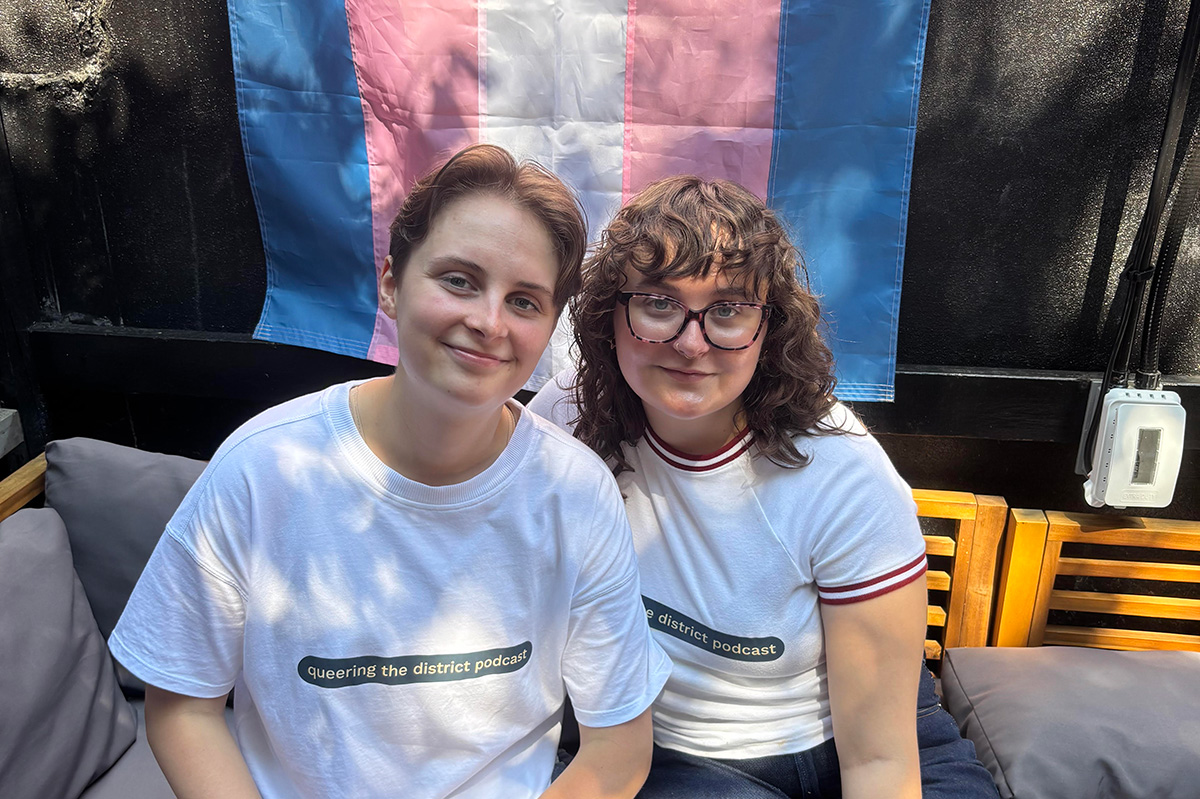
On June 25, as Pride month inched toward its end, three queer creators launched an ambitious project to honor the spaces that built D.C.’s LGBTQ community—and connect them to today’s queer life. The first episode of their podcast, Queering the District, hit streaming platforms that day, aiming to spotlight what host and co-creator Abby Stuckrath calls “third places”: bars, clubs, and gathering spots that have served as hubs for queer life across the city.
Each episode of the 10-part series delves into a different piece of D.C.’s queer past—from landmark clubs to untold personal stories—told through the voices of drag legends, activists, DJs, historians, and patrons who lived it. The show also threads together personal experiences from today’s community, bringing the listener on an auditory journey from Prohibition-era speakeasies to contemporary nights out at places like As You Are or Saints & Sinners.
Abby Stuckrath, alongside her sibling Ellie Stuckrath, and producer Mads Reagan, make up the podcast’s creative team. A recent journalism graduate of American University, Abby told the Blade that her passion for queer storytelling began during college—and that D.C. itself played a defining role in shaping her queer identity.
“I went to American University. I graduated last year and studied journalism. When I was in school, I always wanted to focus on queer stories – especially in D.C., because I’m from Denver, Colorado, I’ve never lived in a place like this before. D.C. has always just kind of been a place I call home when it comes to my queer identity.”
But breaking into the media to tell those stories wasn’t easy. Stuckrath quickly learned that editorial support—and funding—for queer-focused projects is limited. So she decided to do it her own way.
“I kind of found out that if you want to tell stories, you kind of have to do it on your own– especially when it comes to queer stories. There’s not a lot of people begging for us to talk about queer people and to pay you for it. So I was like, ‘Okay, let’s just do it on my own.’”
The idea for the podcast first took root in conversations with Ellie, Abby’s sibling and biggest supporter. Ellie had also moved to D.C. to find more space to explore and express their queer and gender identities. Together, the two began shaping a vision that would combine storytelling, sound design, and grassroots community input.
“I was like, ‘I don’t know what exactly I want to do yet, but I want it to be queer, and I want it to be about D.C., and it’s going to be called Queering the District, and we’re going to find out what that means.’ And Ellie is my biggest supporter, and my best friend. And they were like, ‘Hell yeah. Like, let’s do this.’ And so we decided to just do it together.”
The name stuck—and so did the mission. The team began researching queer D.C. history and found a city overflowing with stories that had rarely been documented, especially in mainstream archives.
“We started looking up the history of queer culture in D.C., and it kind of just clicked from there,” Stuckrath said. “I did not know anything about how rich our history is in the city until one Google search, and then I just kept learning more and more. I was kind of pissed because I studied gender studies in school in D.C. and didn’t learn shit about this.”
Season one focuses on the role of third places—non-work, non-home spaces where queer people could gather, exist fully, and build community.
“Third places have always been the epicenter of queer life… places outside of just your own personal home, because sometimes that isn’t a safe place. And of course, the work most commonly in the past and still today, isn’t a safe place for queer people to be full of themselves. So like, bars were the first place for queer people to really thrive and meet each other.”
To make the show participatory, Queering the District includes a twist: a voicemail line where anyone can call in and share a memory or question. The team calls the phone “Fifi”—a nod to the kind of retro guestbooks often used at weddings, but reimagined for queer nightlife and history.
“We wanted to find a way for people to share their stories with us anonymously… so even though we start in Prohibition, we wanted to connect it to now—like, those people who were singing jazz to each other in a white queer bar are connected to you singing karaoke on a Sunday night at your favorite gay bar. We’re all interconnected by this third place of queer bars in D.C.”
Those connections are emotional as well as historical. While building the series, one realization hit Stuckrath particularly hard: the immense loss of queer spaces in D.C., especially in neighborhoods that have since been heavily redeveloped.
“Every time I go to a Nats game, I think about, well, this just replaced five gay bars that used to be here. It used to be the home of Ziegfeld’s… Tracks, which was almost 2,000 square feet, with a volleyball court in the back, a fire pit, and iconic light show. I just didn’t know that we had that, and it made me sad for the queer elders that are in our city now who walk the streets and don’t see all those places they used to call home.”
That sense of loss—alongside the joy and resilience of queer community—is what the show aims to capture. As the podcast continues, Abby hopes it serves as both a celebration and an educational tool, especially for young LGBTQ people arriving in D.C. without realizing the queer foundations they’re walking on.
“D.C. is a unique city, and specifically young queer people who are hoping to move to the city—to know that you’ve got to know your history to be here. I hope this serves as an easier way for you to consume and learn about queer history, because queer history defines how we move in life.”
And for all the voices still left out, Abby is clear: this podcast is an open door, not a final word.
“This is a perfectly imperfect podcast. We should just be a starting point. We shouldn’t be the ending point.”
New episodes of Queering the District drop every Wednesday on all major platforms.
Travel
Manchester is vibrant tapestry of culture, history, and Pride
Alan Turning Memorial is among English city’s many attractions
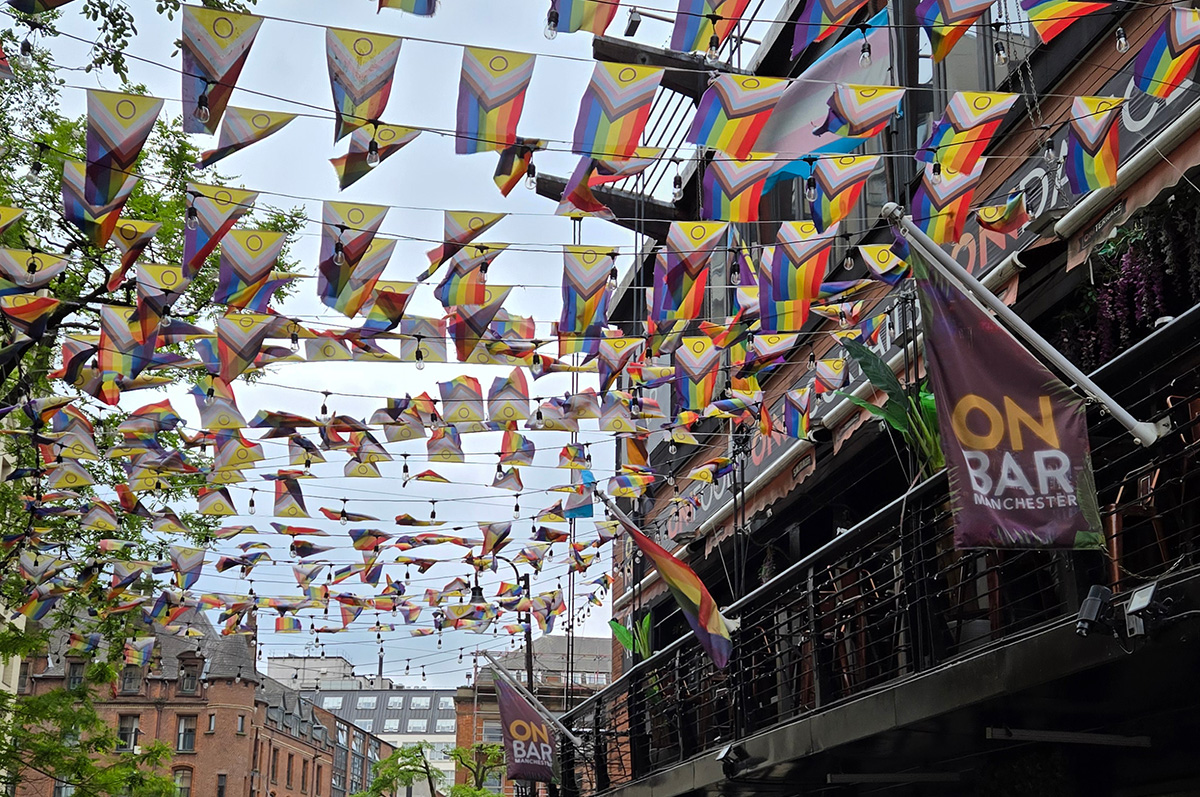
Manchester, England, is not only famous for its industrial heritage, music scene, and football clubs — it’s also home to one of the most vibrant and historically significant LGBTQ communities in the U.K. Often referred to as the “gay capital of the North,” Manchester has been a pioneer in LGBTQ rights, visibility, and celebration, cultivating a culture of inclusivity that continues to thrive today.
The roots of Manchester’s LGBTQ history stretch back centuries, but it was during the 20th century that the city truly became a hub for activism and progress. In 1880, a scandal known as the “Manchester Drag Ball” brought national attention to the city when police raided a fancy dress ball attended by men in drag. Though the incident was used to stigmatize the community, it also marked one of the first widely publicized moments of queer expression in the city.
Manchester is home to several institutions that preserve and celebrate queer history. The LGBT Foundation, based in the city, is one of the U.K.’s leading LGBTQ charities, providing health and support services as well as educational resources.
The city is also immortalized in pop culture as the backdrop for “Queer as Folk,” the groundbreaking 1999 television series created by Russell T. Davies. The show, set in Manchester’s Gay Village, helped bring the realities of LGBTQ life to mainstream audiences and played a pivotal role in shaping public attitudes.
Manchester, is a city that lives and breathes resilience. It’s a place where cobblestone streets echo with the voices of industrial workers, punk rockers, activists, and proud members of the LGBTQ community. I came here seeking stories — some hidden in old libraries, others pulsing through neon-lit streets — and left with a sense of belonging I hadn’t expected.
My base for this journey was the magnificent Kimpton Clocktower Hotel. Located in a former insurance building dating back to the 1890s, it seamlessly marries historic grandeur with modern luxury. Walking through its doors felt like entering a different era. The soaring ceilings, intricate tilework, and dramatic staircases told stories of old Manchester, while the in-room record players spinning tracks by Oasis made sure I knew exactly where I was.
The heart of the hotel is The Refuge, a restaurant and bar that buzzes with energy. Whether sipping cocktails beneath the Winter Garden’s lush greenery or sharing small plates that borrow flavors from around the world, I felt immersed in the city’s welcoming vibe. Even in its luxury, the Kimpton feels like a place for everyone, especially when there is a DJ spinning some cool jazzy beats.
One thing I loved about this property is their “Forgot it? We’ve got it” service. Whether its toothpaste, a shaving kit, or phone charger, the helpful staff have you covered. I tend to forget at least one necessity on every trip. The Kimpton’s central location places guests within walking distance of Manchester’s vibrant cultural scene, including the Palace Theatre, Canal Street, and various shopping and dining options.
My first stop in Manchester was the John Rylands Library, an architectural marvel of neo-Gothic design. I was there specifically to view “The Secret Public” exhibition. It traces Manchester’s underground art scene, especially its ties to queer culture and punk resistance. Flyers, magazines, and photographs are on display.
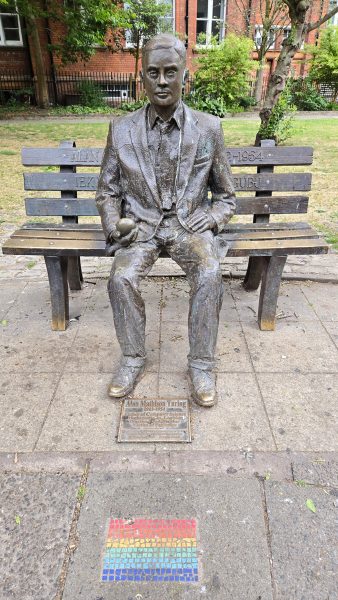
And while we are on the topic of LGBTQ history, the best way to understand Manchester’s queer roots is by talking to the locals. The Free Manchester Walking Tours offers a Queer History Tour, led by passionate guides who have in depth knowledge of the city’s LGBTQ history and culture. We began our tour in Sackville Gardens, home to the Alan Turing Memorial and the Beacon of Hope, a tribute to those affected by HIV/AIDS. It’s a space for reflection, nestled just beside Canal Street’s constant thrum. For those not familiar with Alan Turing, he was a pioneering mathematician and computer scientist, best known for his role in cracking the German Enigma code during World War II, a breakthrough that helped shorten the war and save countless lives. Often regarded as the father of modern computing, Turing laid the theoretical foundation for artificial intelligence. Despite his monumental contributions, he was persecuted for being gay, ultimately leading to his tragic death in 1954. Today, he is celebrated as both a scientific genius and a symbol of the ongoing struggle for LGBTQ rights.
No trip to Manchester would be complete without a night — or three — spent in the Gay Village. Centered around Canal Street, it’s a place that radiates warmth and freedom. What once was a hidden, underground scene in the 1980s has become a global symbol of LGBTQ pride.
During the day, you’ll find people sipping coffee along the canal and by night, the rainbow flags light up the street. Spaces like Via and the Eagle pulse with music and laughter, while Cruz 101 remains a sacred institution for dancefloor devotees. This is more than a party district; it’s a cultural hub, one that has helped shape national conversations and lead by example.
Manchester’s gay scene is more than just nightlife. In the Northern Quarter, I stumbled into Feel Good Club. a queer-owned café that quickly became one of my favorite stops during my trip. Feel Good Club is a café but the space also hosts workshops, mental wellness events, and spontaneous conversations with strangers who somehow feel like old friends. I ordered a bowl of apple-soaked oats and I have to say, it was one of the most delicious and inexpensive things I ate during my entire trip to England. I should have asked for the recipe!
A few blocks away sits Queer Lit, an LGBTQ bookstore filled to the brim with stories I wish I’d had growing up. From queer romance and fiction to books on trans identity and intersectionality, the shop is both cozy and revolutionary. Queer Lit claims to have the largest selection of LGBTQ books in all of Europe. Beyond books, the store hosts events such as workshops, live readings, and book clubs, providing a safe and inclusive space for the community to gather and celebrate queer literature. They also serve a variety of beverages. I would definitely recommend trying one of their hot chocolate drinks.
Though my trip didn’t coincide with Manchester Pride, visitors can expect tens of thousands each August. Pride here features a blend of celebration and activism. From glitter-filled marches to thoughtful panel discussions, it’s a reflection of the city itself: joyful, inclusive, and unafraid to speak truth to power. Importantly, the money raised goes straight back into the community, funding LGBTQ+ health initiatives, charities, and support services. Also in August is SCENE, Manchester’s LGBTQ+ Film and TV Festival, which consists of a week of new and classic LGBTQ cinema and TV screenings, panels, and other events.
All this touring and learning about queer history made me hungry, so for dinner, I ventured to Maray, a Middle Eastern-inspired gem in the city center. Its signature “Disco Cauliflower” — roasted whole and topped with tahini, pomegranate, and harissa — was a revelation. The food, like the city, defied expectations. It was spicy, complex and comforting. I would also recommend trying the crispy sea bass with broccoli slaw. Maray’s vibe is relaxed yet refined, a perfect place to unwind after a day of exploration. Its inclusive, welcoming spirit felt aligned with everything I’d experienced in Manchester so far.
For a more casual dining experience, head over to Freight Island, a unique food hall and entertainment venue located near Piccadilly Station. The venue features a variety of locally owned food stalls including Mia’s Arepas, Ornella’s Little Kitchen and Mega Gyros. It’s a great place to grab a quick bite or cocktail after work with friends.
Manchester may not be as polished as London, but that adds to its charm and intrigue. I tend to enjoy cities like Manchester over their larger neighbors. During my entire stay, I was able to walk to every attraction I visited and by experience, the best way to see a city is on foot. It’s also a great way to burn off those extra calories.
Whether you’re wandering Canal Street at sunset, or simply sipping hot chocolate at Queer Lit, Manchester is a place where you can be yourself and belong.
Enjoy the journey!
Books
Embracing the chaos can be part of the fun
‘Make Sure You Die Screaming’ offers many twists and turns

‘Make Sure You Die Screaming’
By Zee Carlstrom
c.2025, Random House
$28/304 pages
Sometimes, you just want to shut the door and forget what’s on the other side.
You could just wipe it from your memory, like it didn’t occur. Or create an alternate universe where bad things never happen to you and where, as in the new novel “Make Sure You Die Screaming” by Zee Carlstrom, you can pretend not to care.

Their mother called them “Holden,” but they’d stopped using that name and they hadn’t decided what to use now. What do you call an alcoholic, queer, pessimistic former ad executive who’s also “The World’s First Honest White Man,” although they no longer identify as a man? It’s a conundrum that they’ll have to figure out soon because a cop’s been following them almost since they left Chicago with Yivi, their psychic new best friend.
Until yesterday, they’d been sleeping on a futon in some lady’s basement, drinking whatever Yivi mixed, and trying not to think about Jenny. They killed Jenny, they’re sure of it. And that’s one reason why it’s prudent to freak out about the cop.
The other reason is that the car they’re driving was stolen from their ex-boyfriend who probably doesn’t know it’s gone yet.
This road trip wasn’t exactly well-planned. Their mother called, saying they were needed in Arkansas to find their father, who’d gone missing so, against their better judgment, they packed as much alcohol as Yivi could find and headed south. Their dad had always been unique, a cruel man, abusive, intractable; he suffered from PTSD, and probably another half-dozen acronyms, the doctors were never sure. They didn’t want to find him, but their mother called…
It was probably for the best; Yivi claimed that a drug dealer was chasing her, and leaving Chicago seemed like a good thing.
They wanted a drink more than anything. Except maybe not more than they wanted to escape thoughts of their old life, of Jenny and her death. And the more miles that passed, the closer they came to the end of the road.
If you think there’s a real possibility that “Make Sure You Die Screaming” might run off the rails a time or three, you’re right. It’s really out there, but not always in a bad way. Reading it, in fact, is like squatting down in a wet, stinky alley just after the trash collector has come: it’s filthy, dank, and profanity-filled. Then again, it’s also absurd and dark and philosophical, highly enjoyable but also satisfying and a little disturbing; Palahniuk-like but less metaphoric.
That’s a stew that works and author Zee Carlstrom stirs it well, with characters who are sardonic and witty while fighting the feeling that they’re unredeemable losers – which they’re not, and that becomes obvious.
You’ll see that all the way to one of the weirdest endings ever.
Readers who can withstand this book’s utter confusion by remembering that chaos is half the point will enjoy taking the road trip inside “Make Sure You Die Screaming.”
Just buckle up tight. Then shut the door, and read.
The Blade may receive commissions from qualifying purchases made via this post.



